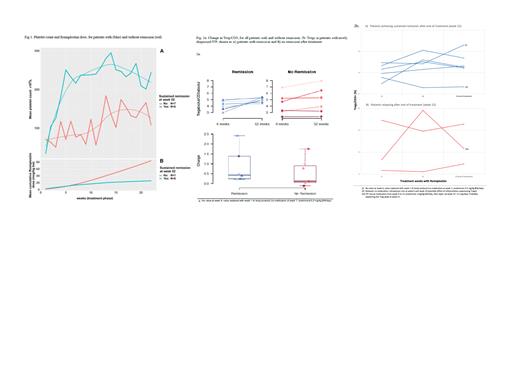Abstract
Introduction: To date most treatment strategies of primary immune thrombocytopenia (ITP) are symptomatic, preventing premature platelet destruction and increasing their production. New strategies should focus on targeting the immune dysregulation, rather than the platelet count. Rituximab and dexamethasone have the potential to induce tolerogenic mechanisms, however with moderate long-term results (<30%). Thrombopoietin-receptor agonists (TPO-RAs) obviously have the potential to affect the course of the disease with up to 30% treatment-free remission. Possible mechanisms could be exposure to high-dose antigen and/or the innate immune activity of platelets, especially the release of TGF-ß, which may stimulate or restore regulatory T cells (Tregs). Tregs play a fundamental role in the maintenance of immune tolerance. Previous studies have shown lower and impaired function of Tregs in the peripheral blood of ITP patients.
Methods: The iROM study is a national multi-center, open label, single arm pilot study that aims to explore possible immunomodulatory effects of romiplostim administered as second line drug in young adults with ITP. Patients who failed, did not tolerate or relapsed after first-line treatment with steroids and/or intravenous immunoglobulin (IVIG) were included, irrespective of disease duration. Romiplostim was administered subcutaneously for 22 weeks and then stopped. The dose was adjusted every week depending on platelet response, following the product information (target platelet count 50-200x10 9/l). Follow-up was performed until week 52. Immunologic investigations were done at weeks 1, 6, 12, 22 and 52. Tregs (CD4 +, CD25 +, CD127 low) were investigated by flow cytometry and reported as percentage Tregs/CD3. Because of comedication at week 1 (IVIG, steroids), week 6 was defined as the initial immunological state. Confirmatory tests were performed using a paired samples Wilcoxon test at a two-sided alpha of 5%. The p-values are adjusted using the Holm method for all secondary analyses.
Results: Between 2016 and 2020, 15 patients were enrolled, including two dropouts. Of the 13 patients analyzed, 9 had newly diagnosed ITP (<3 months), median age 31 years (IQR 8), and 4 chronic ITP (>12 months), median age 31.5 years (IQR 8.75), with a median platelet count at enrollment of 26x10 9/l (IQR 41) and 49.5x10 9/l (IQR 88.5), and at week 52, 168x10 9/l (IQR 88) and 96x10 9/l (IQR 23.5), respectively. All patients were on ITP treatment at enrollment (steroids and/or IVIG). In 6 out of 9 patients with newly diagnosed ITP, discontinuation of romiplostim was successful with sustained treatment-free complete remission (TFR) at 1 year, whereas all patients with chronic ITP relapsed and restarted various treatments.
Interestingly, romiplostim dose titration was lower and platelet count response higher and more stable in patients achieving TFR (Fig 1). Platelet counts in patients with relapse showed a very jagged curve over the 22 weeks of treatment. Tregs increased between weeks 6 and 22 (end of treatment), so as between weeks 6 and 52 (end of study) in the whole group of patients with a median change of 0.62 (CI95 (0.14, 1.26)) (p=0.017) at end of study. Tregs variation for patients with sustained TFR versus no remission is shown in Fig 2a, and for the 9 patients with newly diagnosed ITP in Fig 2b.
Conclusion : These results support the assumption that early treatment of ITP with TPO-RAs, e.g. romiplostim, could positively influence the natural course of ITP. Induction of tolerance may be more successful in the early stage of an autoimmune disorder because of autoimmune expansion and epitope spreading. We also assume that induction of tolerance may be more successful in younger patients because of potentially reduced immunosenescence. In this small trial only 3 out of 9 patients (33%) with newly diagnosed ITP relapsed after stopping treatment according to the iROM protocol. In contrast, all 4 patients with chronic ITP relapsed after stopping treatment. Our observation of a higher increase of platelets and a more stable increase of Tregs in patients with sustained TFR in comparison to those with relapse corroborate the hypothesis that the tolerogenic stimulus may be supported by the platelet mass. Limitations of the study were the small sample size, the heterogeneity of the patient population regarding ITP duration, and preceding medications overlapping the first study weeks.
Schifferli: Sobi: Honoraria; Novartis: Honoraria, Research Funding. Rovo: Novartis: Research Funding; AG Alexion: Honoraria; BMS: Honoraria; OrPhaSwiss GmbH: Honoraria; Swedish Orphan Biovitrum AG: Honoraria; Amgen: Other: Financial support for congresses and conference travel; AstraZeneca: Other; BMS: Other; Sanofi: Other; Roche: Other; AstraZeneca: Honoraria; Novartis: Honoraria; CSL Behring: Research Funding; AG Alexion: Research Funding. Kuehne: Novartis: Research Funding; UCB: Honoraria; SOBI: Honoraria; Amgen: Research Funding.


This feature is available to Subscribers Only
Sign In or Create an Account Close Modal